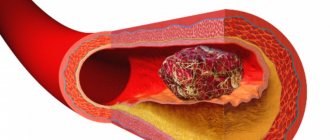Temperature from nerves - professional psychologists and neurologists are not surprised by this phenomenon. After all, the human body reacts sensitively to various processes occurring in the nervous system. You just have to strain yourself a little or overdo it with stress, and the body will respond with an increase in temperature. Clinical psychologist, neuropsychologist Irina Khvingia told AiF.ru about what thermoneurosis is, who is more susceptible to it than others and what consequences it can lead to .
The essence of the problem
There is no official diagnosis of “thermoneurosis” as such. But the phenomenon itself exists. Thermoneurosis is usually understood as a psychosomatic disease when a person experiences an increase in temperature over a long period. The numbers will be low-grade, that is, the temperature will fluctuate between 37-37.5 degrees. This is one of the manifestations of vegetative-vascular dystonia, and some experts even consider this state of affairs to be a sign of depression.
There are two types of thermoneuroses: psychogenic, which occurs against the background of stress, and neurogenic, when the brain is affected by hematomas, cysts and other formations that put pressure on the thermoregulation centers.
Article on the topic
Psychologist instead of antipyretics. How to calculate thermoneurosis?
If we are talking about a tumor, then we will have to be regularly examined and monitored. If the tumor does not grow, people live well with it for many years. In this case, it is usually recommended to undergo an MRI procedure once a year in order to monitor the condition of the formation in detail.
Temperature of a psychogenic nature can be elevated for a long time: from several days to several years. It all depends on who and how helps a person cope with the disorder. If everything is left to chance, the situation can be long-lasting.
We talk about thermoneurosis when the temperature remains unchanged throughout the day and for at least several days. For example, if it always stands at 37.2 or 37.3. To exclude factors influencing temperature and determine a more accurate diagnosis, it is recommended to draw up a temperature chart. Indicators must be measured three times a day. The first time is 20-30 minutes after sleep. There is no need to do it right away, without getting out of bed, because after waking up, everyone’s temperature is slightly elevated. Then measurements are taken during the day without reference to meals. And the third dimension is before bed.
Vegetative-vascular dystonia - a disease or a myth? More details
Causes
- Vasoconstriction. With excitement, that is, preparation for “fight and flight,” the blood vessels constrict and the muscles tense. This causes the body to warm up.
- Acceleration of metabolism. Against the background of chronic stress and anxiety, metabolism often accelerates. This acceleration results in an increase in body temperature.
- Hypersensitivity. In a healthy person, body temperature always fluctuates depending on his physical activity, time of day, menstrual cycle in women and many other reasons. But people who do not suffer from excessive suspiciousness do not focus on these changes. And neurotics - yes.
So in women, the normal temperature in the second half of the menstrual cycle often reaches 37.2-37.3 degrees. But if a woman is calm and is not preparing to conceive a child, then it does not occur to her to track this indicator. But nervous girls, those who suffer from VSD, like to measure their temperature and are afraid of the data obtained.
Fear leads to a further increase in nervous tension, and, consequently, to a further rise in temperature.
Often the temperature with vegetative-vascular dystonia rises in the evening. Although normally, in the absence of an inflammatory process in the body, it should decrease. But it is precisely the fear of the possible presence of this very inflammatory process that increases nervous tension in an anxious patient in the evening. And this tension leads to fever.
Who is susceptible
The psychogenic option is more of a topic for teenagers and older people. After all, the loads are growing. For example, for children this means increased responsibility at school. A large number of classes, additional clubs and sections. Normal overwork occurs, the body cannot stand it and produces such a reaction.
This condition is typical for people with a hysterical personality type, those who are susceptible to hypochondria, suspiciousness, and those who are prone to various types of psychosomatics. Because they are the first to react to stress, and an increase in body temperature is the simplest reaction.
Can stress cause fever?
In this article, the therapist at the NATALI-MED medical center will consider the possibility of an increase in temperature due to stress, which some patients are interested in.
The fact is that an increase in body temperature above 37.2 degrees is a common problem that causes many patients to consult a doctor. The symptom may be accompanied by skin rashes, aches in muscles and joints, which allows a good therapist at the NATALI-MED medical center to make the correct diagnosis. Temperature indicates our body’s fight against viral infections, especially in respiratory diseases, but temperature can also indicate the penetration of infection.
In this article we will try to figure out whether the temperature can rise due to stress. If you are concerned about an elevated temperature, of course, you need to undergo a full examination by a doctor at the NATALI-MED medical center - this is often due to the penetration of a virus into the body. Some believe that the temperature may rise due to stress, and to come to this conclusion, it is necessary to consult a doctor and rule out other causes of this symptom. 80% of cases are associated with infection in the body, and in 19% the temperature rises due to disruption of the thyroid gland, autoimmune diseases, hypothalamic disease and others.
It should be understood that almost more depends on the patient than on the doctor, since attention to one’s health and timely consultation with a doctor allows one to avoid many health problems in the future. Once you have an appointment with a good therapist at the NATALI-MED medical center, you will definitely be prescribed a clinical blood test, a general urine test, a biochemical blood test and, if necessary, other examinations, such as an electrocardiogram, ultrasound, ultrasound and others. You can often come across the statement that the hypothalamus is “to blame” for the rise in temperature. The so-called hypothalamic syndrome can be accompanied by the following symptoms: impaired metabolism of fats and carbohydrates, headaches, increased sweating and thirst, the desire to eat sweets all the time; patients are worried about attacks of melancholy, increased irritability, and fever. In fact, the pathological syndrome is metabolic syndrome, obesity, diabetes, a symptom of HIV infection, hypertension, epilepsy or post-traumatic stress disorder. Such diverse symptoms may indicate problems with hormones, neurological diseases or mental disorders, and in case of the listed symptoms, you need to contact a good therapist at the NATALI-MED medical center, undergo an examination and find out what such serious symptoms indicate.
Inexplicable manifestations turn out to be the result of quite a few well-known diseases that can be treated. Hypothalamic syndrome is a rather dubious diagnosis, so its diagnosis requires a highly qualified doctor and the appointment of more serious examinations, including MRI of the head, consultation with an endocrinologist and others. An unreasonable increase in temperature may be a consequence of psychogenic fever, and scientists have noticed that thin women can have an increase in body temperature, while no infections were observed, as a result of which they found out that body temperature can increase from stress: the receptors of adipose tissue are irritated due to nervous overexcitation. Adipose tissue provides the body with heat, but does not supply the energy potential for which white fat is responsible. In the presence of infection, the immune system forces the body to work at full capacity; During stress, immune defense is not activated, but mechanisms limiting heat transfer are activated, which is how psychogenic fever occurs due to increased emotional excitement.
Scientists have found that such symptoms may indicate signs of lupus, AIDS, infection; they are typical for people who often experience anxiety and stress. Elevated body temperature also negatively affects sleep, so if these symptoms bother you, be sure to get examined at a good medical center in Strogino and consult with your doctor.
Consequences of the problem
Thermoneurosis, which lasts for a long time, affects human health. And it doesn’t matter whether the body is a child’s or an adult’s. Children, as a rule, become irritable against its background. And adults become exhausted faster. Naturally, all this affects performance, because there is constantly not enough strength. At a constantly elevated temperature, the body requires more strength to concentrate attention and memory.
There are even more serious situations when symptoms such as fainting, arrhythmias, headaches, and sometimes insomnia appear. But still, for the most part, thermoneurosis is asymptomatic, accompanied only by fever and irritability. Against this background, the quality of life significantly decreases.
Temperature record. How to deal with high numbers on a thermometer Read more
A state of intense anxiety
Now, in order to understand the possibility of the influence of mental and emotional states on body temperature, you need to understand the topic of experiences.
In understanding the essence of the problem, psychosomatics plays an important role. The term refers to the influence of psychological factors on the occurrence and course of somatic (physical) diseases. This phenomenon perfectly explains the possibility of changes in body temperature during various emotional and psychological disturbances.
Experience is a complex process of reflecting in consciousness the emotional states that a person experiences. It warns, but does not solve the problem itself, which gave rise to anxiety, that is, it serves as the primary preventive mechanism for protecting the human body.
If the cause of the source of the experience is not resolved, the second defense mechanism is activated - bodily signals that manifest themselves in the form of diseases. This also includes the thermal factor. This is a signal that something is bothering a person or that he is in danger. With the elimination of the cause (threat), psychosomatic and somatic defense mechanisms are turned off.
The impact of experiences on the body
The temperature can rise as a result of stress, excitement, worry or fear. Now let’s figure out in what cases experiences lead to changes in thermoregulation and how this manifests itself.
It is important not to confuse the effect of anxiety and the impact of a real disease. More often it is an acute respiratory viral infection. The main difference between ARVI and the influence of experience is its broader symptomatology, which is not limited to thermal manifestations.
If the rise in temperature is not accompanied by other symptomatic manifestations of a cold, the thermometer shows the norm immediately after the end of the stressful situation that served as the source of anxiety or excitement, the reason is clear - this is a psycho-emotional state.
Excitement can cause a protective reaction of the body in the form of mobilization. The threat of danger will lead to the release of the hormones cortisol and adrenaline. Cortisol is involved in the development of stress reactions.
Adrenaline mobilizes the body to eliminate the threat. Cortisol and adrenaline affect the condition of the entire body. The need for blood flow to the limbs and head requires an acceleration of metabolism.
Here you cannot do without thyroid hormones, and therefore the hypothalamus. Their activity will provoke changes in the body’s thermoregulation. With the elimination of the source of anxiety and stress, the hormonal balance in the body will be restored, which will lead to the normalization of thermoregulation.
Vegetovascular dystonia, or VSD, deserves special consideration. This term refers to a syndrome caused by disorders of the autonomic nervous system (the part of the nervous system that regulates the activity of internal organs, glands, blood and lymphatic vessels). The manifestation of the disease is often low-grade fever - a prolonged slight increase to 37-37.5 ° C.
Neurons of the autonomic nervous system are interconnected with mirror neurons responsible for emotions. As a result of disturbances in the functioning of the autonomic nervous system, changes occur in the activity of the corresponding neurons.
These processes “affect” mirror neurons, which provoke stressful experiences. An increase in temperature occurs as a protective mechanism. Due to pathological changes, the process is often low-grade in nature.
The psychosomatic nature of the influence of anxiety on temperature manifests itself in a state called “flight from illness.”
- Before an event that causes strong feelings and excitement, a person’s health condition sharply deteriorates - the temperature rises, other signs of some common viral or cold disease appear.
- The doctor diagnoses ARVI. Treatment is prescribed.
- Due to illness, a person is forced to miss an event, the occurrence of which caused him anxiety.
- After the event passes, the state of health rapidly improves, all symptoms of the disease instantly disappear.
“Flight into illness” is a protective reaction of the body to avoid situations that pose a threat.
This kind of simulation is common in children. It is important here not to confuse “escaping from illness” with a real simulation. The phenomenon of “flight into illness” often manifests itself in real stressful situations.









